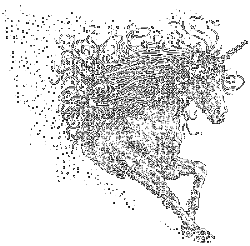| 

Magic The ultimate root of the word Magic is unknown, but proximately it is derived from the Magi, or priests of Chaldea and Media in pre-Aryan and pre-Semitic times, who were the great exponents of this system of thought, so strangely mingled of superstition, philosophy, and scientific observation. The fundamental conception of magic is that of the spiritual vitality of all nature. This spiritual vitality was not, as in polytheism, conceived as separated from nature in distinct divine personalities. It was implicit and immanent in nature; obscure, undefined, invested with all the awfulness of a power whose limits and nature are enveloped in impenetrable mystery. In its remote origin it was doubt-less, as many facts appear to show, associated with the cult of the dead, for death was looked upon as the resumption into nature, and as the investment with vague and uncontrollable powers, of a spiritual force formerly embodied in the concrete, limited, manageable, and therefore less awful form of a living human personality. Yet these powers were not altogether uncontrollable. The desire for control, as well as the suggestion of the means for achieving it, probably arose from the first rude practices of the art of healing. Medicine of some sort was one of the earliest necessities of man. And the power of certain natural substances, mineral or vegetable, to produce bodily and mental effects often of a most startling character would naturally be taken as signal evidence of what we may call the "magical" conception of the universe.[Thus the Greek pharmakon = medicine, poison, or charm; and I am informed that the Central African word for magic or charm is mankwala which also means medicine.] The first magicians were those who attained a special knowledge of healing or poisonous herbs; but "virtue" of some sort being attributed to every natural object and phenmenon,a kind of magical science, partly the child of true research, partly of poetic imagination, partly of priestcraft, would in time spring up, would be codified into rites and formulas, attached to special places and objects, and represented by symbols. The whole subject has been treated by Pliny in a remarkable passage which deserves quotation at length . 'Myths and Legends of the Celtic Race' [1911, 1922]
by Thomas Rolleston 
Pliny on the Religion of Magic "Magic is one of the few things which it is important to discuss at some length, were it only because, being the most delusive of all the arts, it has everywhere and at all times been most powerfully credited. Nor need it surprise us that it has obtained so vast an influence, for it has united in itself the three arts which have wielded the most powerful sway over the spirit of man. Springing in the first instance from Medicine - a fact which no one can doubt-and under cover of a solicitude for our health, it has glided into the mind, and taken the form of another medicine, more holy and more profound. In the second place, bearing the most seductive and flattering promises, it has enlisted the motive of Religion, the subject on which, even at this day, mankind is most in the dark. To crown all it has had recourse to the art of Astrology; and every man is eager to know the future and convinced that this knowledge is most certainly to be obtained from the heavens. Thus, holding the minds of men in this triple bond, it has extended its sway over many nations, and the Kings of Kings obey it in the East" 
|
 Free Forum Hosting
Free Forum Hosting